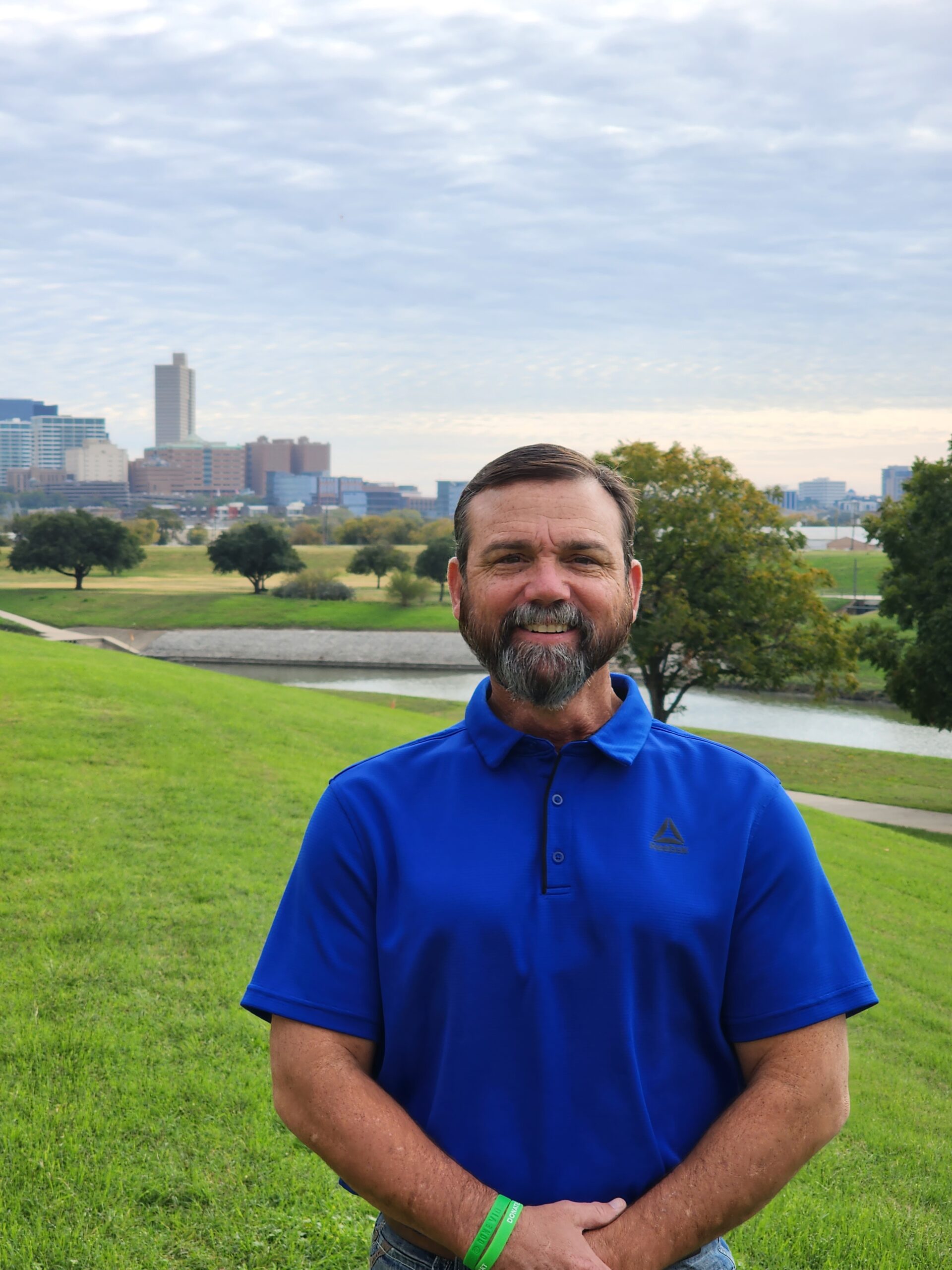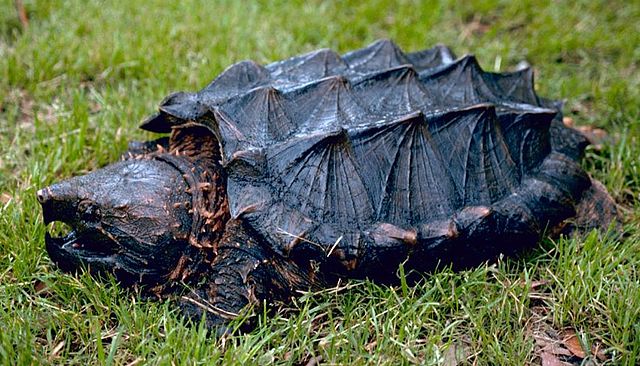
Dean Kuhn is a survivor.
Before he joined Tarrant Regional Water District in 1991, Dean’s life had taken a grim turn. At the young age of 19, he was diagnosed with Hodgkin’s lymphoma, an aggressive form of cancer that spreads quickly. His only path forward was through a punishing course of intensive chemotherapy and radiation treatments.
Dean was diagnosed in 1989, completed treatment in 1990, and in remission, started working for TRWD one year later. Things seemed to be going well.
His first TRWD job was in the tire shop, the operations division for vehicle repairs. Over time, he moved to a truck driver position, became an equipment operator and was promoted to an inspector role during construction of the Benbrook pipeline in the mid-1990s. He later returned to operations, running equipment and overseeing in-house construction projects along the floodway project.
From there, Dean became a construction coordinator, training and managing third-party permits, working in coordination with the U.S. Army Corps of Engineers. He moved to the real property department as a Land Agent II in 2008, was later promoted to Senior Land Agent and has been in that position since.
In a heartbeat, everything changed
Sometime before 2000, Dean started feeling a little out of breath here and there, but he chalked it up to just being out of shape. By 2001, his situation had worsened considerably.
On an inspection of Fort Worth’s French Lake with fellow employee Darrell Beason, he suddenly felt his chest tighten. He couldn’t catch his breath and felt a burning pain between his shoulders. Dean was forced to stop and rest. When he started back up, it happened again. Dean was just 32 years old at the time.
His friend Darrell – who was then federal floodway manager and is now TRWD chief of operations – insisted on taking Dean to the hospital. Although neither of them knew it at that moment, Dean was in heart failure.
“If it hadn’t been for Darrell, there’s no telling what would have happened. I probably wouldn’t be here now if he hadn’t pushed me to go to the hospital,” Dean said.
Fortunately, the doctor on call had studied the effects of radiation on the heart and was able to pinpoint the cause of Dean’s condition. The radiation treatments he had received in his younger years had damaged his arteries.
Two days later, Dean underwent a triple bypass. The procedure was successful, and he returned to work the following month.
“Things didn’t feel stressful. I was back overseeing jobs, managing my usual activities,” he said.
He was a young man with a growing family. One son was 18 months old, and Dean and his wife had recently welcomed a second baby boy. The day after his return to work, later at home with the family, Dean began feeling hot and clammy. He had just put the baby down when his chest started burning and he felt intense pain in his arms. It was a heart attack – the type that doctors call the widowmaker – which occurs when the heart’s largest artery is blocked. In Dean’s case, the blockage was caused by a blood clot.
An ambulance sped him to the hospital, where he stayed for about a week and then returned to work. Some might say that Dean is a walking miracle. At 54 years old now, he is both a medical warrior and a survivor.
Never giving up
Over the years since that fateful day, the earlier radiation treatments have continued taking a toll on Dean’s body. He’s undergone numerous angioplasty procedures, resulting in nine coronary stents to treat narrowed heart arteries.
In 2010, he ended up back in the hospital for another surgery, this time a single bypass. Dean and his youngest son had been doing yard work when they discovered a hornets’ nest. Dean was stung repeatedly while trying to protect his son. If he hadn’t gone to the emergency room that day for the allergic reaction, Dean would have missed the comprehensive exam that determined he needed another heart bypass.
With each health scare, Dean has found his way back – back to his family and back to his job at TRWD. He’s no quitter. He absolutely won’t give up.
In May 2018, he underwent his most challenging surgery of all, a heart transplant. After being on the transplant list for over a year, Dean needed another coronary stent, but it was deemed too risky because of the others already in place and where the new stent was needed. Through his initial evaluation for transplant, it had also been determined that he was at stage 3 kidney disease related to the heart complications – and was just one stage away from kidney dialysis. The only way to reverse the kidney damage would be through the heart transplant. When the heart is no longer pumping efficiently, it causes pressure to build up in the main vein connected to the kidneys, impacting their function as well.
Dean continued to work while waiting for a donor opportunity. It was an incredible relief when the call came, saying that a donor match had been found.
When the doctor called, he said, “I have good news, I have the perfect heart for you.” This is why, to this day, Dean wears a green Donate to Life bracelet with the words “the perfect heart.”
The transplant was successful, and his kidneys began their recovery. Dean remained in the hospital for about 11 days.
During that time, he couldn’t pull himself from his work. Dean was making phone calls and sending emails to keep up with his projects from his hospital room.
“To me, there’s never been any excuse not to go to work,” he said.
When TRWD urged him to rest, even suggesting that his phone and email access could be temporarily suspended if he didn’t slow down, Dean asked his doctors for a permission letter to work remotely during his recovery.
His supervisor Rick Carroll, who was out of town when Dean entered surgery, remembers a phone call just after Dean had been moved to a room following the procedure. The message said he couldn’t make it to work that day because he’d just had a heart transplant.
The role model who shaped Dean’s future and those who inspire him today
Dean is the kind of guy who just doesn’t quit. He credits his father-in-law as being an important role model in his life. Although his father-in-law had undergone back surgeries and other health issues of his own, he was always committed to getting back to work, taking care of family and managing his responsibilities with strength and determination. His grit imparted a valuable life lesson.
Dean’s three sons, now at ages 24, 22 and 19, have also been a driving force in his life.
“I want them to see that no matter what happens, you don’t quit, you persevere, because there’s no excuse, in my opinion, for giving up,” he said.
Not giving up and always moving forward are so important to this man who has faced such adversity in his lifetime. He continues every day to take another positive step forward. With the encouragement of Darrell Beason and others, Dean decided to pursue a higher education and today is working on an associate degree in real estate management, which aligns well with his role at TRWD.
He’s achieved Senior Right of Way status in the International Right of Way Association, the most prestigious professional designation granted professionals in his field, based on experience, education and examination. The right of way designation relates to easements, gas lines, pipelines and other aspects of Dean’s work. He also holds certifications in business management and real estate from Tarrant County College.
“When I was younger, our teachers used to say knowledge is power, and the more you know, the more you broaden your career and open up opportunities,” Dean said.
Dean stays very busy, and he does get tired, but he believes in doing all he can to better himself and serve as a role model for his sons and grandchildren.
“I want them to know that a person doesn’t have to settle for mediocre,” he said.
Valuing the TRWD family and mission
There are many aspects of his work at TRWD that Dean especially values. He enjoys working with the engineers and developers along the floodway and loves that the district is so family oriented and caring.
“Even though TRWD has grown considerably since I started, those compassionate and supportive values are still such a big part of our culture,” he said.
“Working for the district,” he added, “also feels good because you’re giving back to the public, for the betterment of humanity and living.”
The prescriptions Dean takes since his transplant have the potential to increase skin cancer risks. Dean has undergone several Mohs surgeries since his transplant, so he checks in with the dermatologist every four months. He stresses the need to apply sunscreen while working outdoors as well as during recreational activities. Dean watches what he eats to keep his immune system in check. The side effects of all he’s been through will require lifelong diligence, but he’s okay with that. Before the transplant, Dean had trouble walking from the parking lot into his office, and today he’s working out on the treadmill and planning for a spring 2024 5K run. He’s even hoping to bring a few of his TRWD buddies along.
Strength, positivity, never giving up
Through everything, Dean says he’s learned that a positive attitude is the key to healing and the key to life.
“It’s important to keep yourself mentally healthy, maintain your focus and just keep going,” he said.
“Life has a purpose. We’re here for a reason,” he added. “We’re here to serve and persevere.”


